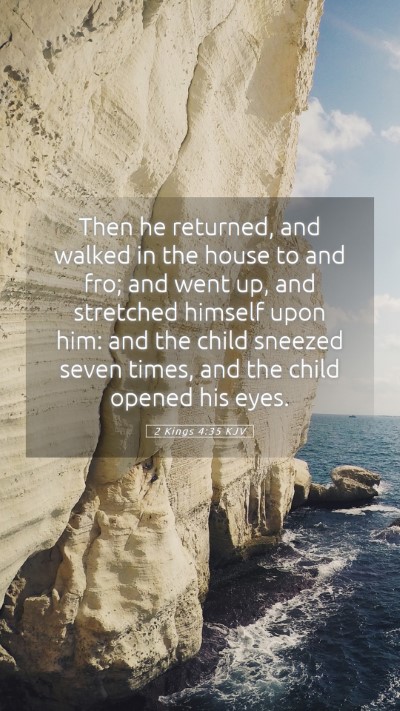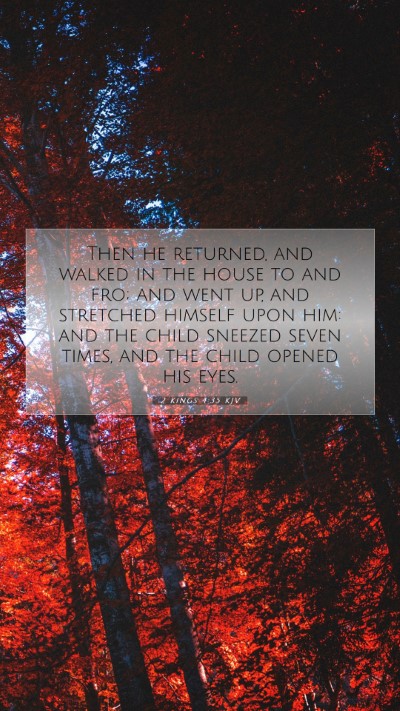Understanding 2 Kings 4:35
This verse is a pivotal moment in the context of the miraculous healing performed by the prophet Elisha. The child, who had died, is brought back to life through Elisha's earnest and faith-filled actions. This scriptural account invites profound reflections on the themes of faith, life, and divine intervention.
Overview of the Commentary
Commentators like Matthew Henry, Albert Barnes, and Adam Clarke provide insights that enrich our understanding of this verse:
- Matthew Henry's Commentary: Henry emphasizes the earnestness of Elisha's actions. He notes that the prophet's repeated movements and prayers symbolize a deep commitment and reliance on God for the miraculous. The act of stretching himself upon the child illustrates a personal investment and God's power at work through Elisha.
- Albert Barnes' Commentary: Barnes provides an analysis of the miraculous event, focusing on the significance of the child sneezing seven times. He highlights the number seven as a symbol of completeness and perfection in the Biblical context, which could signify the complete restoration of life. Barnes also treats the resurrection as a demonstration of God's omnipotence.
- Adam Clarke's Commentary: Clarke expands on the emotional state surrounding this event. He reflects on the sorrow of the child's mother and the prophet's compassion. Clarke argues that Elisha's actions exhibit both the power of God and the profound human emotion involved in witnessing such a miracle.
In-Depth Analysis
Examining this verse involves understanding the broader historical and textual context:
- Historical Context: This miracle reflects the tumultuous times of the prophet Elisha, where miracles were profound signs of God's presence among His people. The episode highlights the importance of prophetic ministry and God’s ongoing care for those in distress.
- Theological Implications: The healing demonstrates God’s sovereignty over life and death, illustrating themes of resurrection that echo throughout Scripture, culminating in the New Testament with Christ’s resurrection.
- Personal Application: Readers are encouraged to reflect on their own faith journeys and the circumstances where they seek God’s intervention, drawing parallels from Elisha’s faith and the miraculous outcome.
Cross References
This verse can be cross-referenced with:
- 1 Kings 17:21-22: The account of Elijah raising the widow’s son.
- Luke 8:54-55: Jesus raising Jairus’ daughter.
- John 11:43-44: Jesus raising Lazarus from the dead.
Conclusion
2 Kings 4:35 serves as a powerful narrative reinforcing the themes of faith, divine intervention, and the miraculous acts performed through God’s prophets. The commentaries provide valuable insights for anyone engaged in Bible study insights, Bible verse interpretations, and Scripture analysis. Understanding such Bible verses is vital for developing a deeper relationship with God and enhancing our Bible study resources.
SEO Content for Bible Study
For those seeking to deepen their Bible study experience, consider joining Bible study groups or engaging in online Bible study. Utilize Bible study tools and Bible study guides to enrich your journey of understanding Scripture. Delve into Bible study topics that explore the meaning of specific passages and how to interpret Bible verses effectively.


